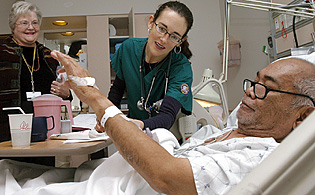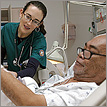As health care providers wrestle with how best to deliver care that adapts to the changes of the last 30 years, a new study is underway to revisit nursing education.
The Carnegie Foundation for the Advancement of Teaching at Stanford University has initiated the study directed by UCSF's
Patricia Benner, chair of the Department of Social and Behavioral Sciences.
Our nursing study is taking place in a context of enormous ferment, including the belief of many nurse executives and nurse educators that today's nurses are undereducated," says Benner, who has spent much of her research career looking at skills acquisition and clinical judgment in nursing practice.
 |
| Patricia Benner visits a patient along with Jenna Buffington, a first-year student in the master's entry program in nursing at UCSF. |
"There is an acute international nursing shortage. Health care delivery has evolved from a nearly exclusive focus on treating individual patients to balancing that with the need for health promotion and prevention. This, in turn, demands that nurses understand public and population health," Benner continues.
"All of this means nurses have to emerge from nursing schools as different types of thinkers than they were 30 years ago."
Against this busy backdrop, the Carnegie study will examine what nurses presently learn through a lens that views a nurse's apprenticeship as having three main components:
• Intellectual training to acquire the necessary knowledge and thinking skills;
• Skills-based practice; and
• Training that fosters a commitment to nursing's ethical standards and to the social roles and responsibilities of the profession.
The study also will look beyond content to understand how that content is being delivered. "Teaching and learning strategies must match the practices that you're trying to promote," says Benner.
Finally, the study is being conducted concurrently and in dialogue with a national study of medical education led by UCSF School of Medicine's faculty member
Molly Cooke and by
David Irby, vice dean for education. In turn, the nursing and medical education studies are taking place within an even bigger undertaking: the Preparation for the Professions Program at the Carnegie Foundation for the Advancement of Teaching. Upon completion of these studies, scholars at the Carnegie Foundation will compare the findings with recently conducted studies of education for the clergy, engineering and law.
Team Effort
Benner is working with a team that includes UCSF faculty members Lisa Day and Molly Sutphen, University of San Francisco faculty member Victoria Leonard and Lori Rodriguez, a Betty Irene Moore Fellow at UCSF. They have designed a study that has two main pieces.
The first consists of site visits to eight schools of nursing chosen for their excellent reputations, their ethnic and geographical diversity, and because they are representative of the possible entry points into nursing. Those entry points (BSN, AD, generic diploma schools, master's entry programs, RN to BSN completion programs and second-degree bachelor's programs) complicate what nursing schools must do. They also complicate what the study must accomplish, because the different entry points make comparisons difficult.
During their site visits, Benner and her colleagues will conduct observations; interview faculty, academic officers, students and alumni; and analyze documents. They are also completing a pilot study at Samuel Merritt College in Oakland. "It's helping us refine our tools and logistics for the main study," says Benner.
The other part of the study will be a national, web-based survey of nursing students and faculty. Survey questions will clarify and confirm findings from the site visits.
Finally, the process includes an extensive review of what's been written on nursing education and policy.
After documenting what is occurring today, the group will make recommendations in conjunction with various accrediting organizations. Ultimately, Benner says, the study is looking for "signature pedagogies" that maximize nurses' ability to cope with the challenges of modern nursing.
"We need to understand if nursing students are getting what they need to practice successfully, given the enormous changes of the last 30 years," says Benner. "Keeping up with changes in treatment and technology is only one piece. Schools have to understand and convey how modern hospitals function and how nurses apply their skills in that context, while also delivering community and home-based care. And they must teach students how to be with patients who are suffering, something that involves a genuine understanding of who these people are, as individuals, as part of a particular cultural group and in the context of their entire community. It's a tremendous amount to teach and to learn."
Source: Andrew Schwartz, Science of Caring magazine
Photo by Jennifer Leigh Sauer
Related Links
UCSF School of Nursing



